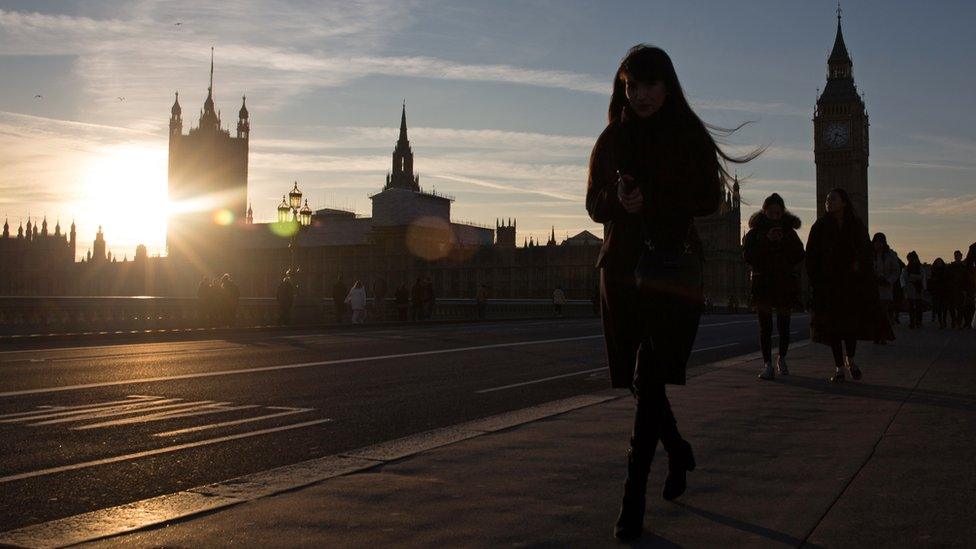Was there really a time sexual harassment was ‘acceptable’?
- Published

It has been said that attitudes towards sexual harassment have changed in recent years. But research into the experiences of women in government suggests it is the expectation they will put up with it that has shifted.
"The culture has changed over the years, what might have been acceptable 15, 10 years ago is clearly not acceptable now."
This comment, made by Sir Michael Fallon after his resignation as defence secretary, is very revealing.
First, for raising the question "Acceptable to whom?", and second for highlighting the culture and employment practices at Westminster lag behind those of many other workplaces.
Party leaders, who have agreed a new complaints procedure amid multiple allegations of sexual misconduct, might find it informative to look at the experience of women in Whitehall - another part of government.
Institutional sexism
During interviews for a history of women in the civil service, external, we found many who spoke of experiences of sexual discrimination and harassment - by both civil servants and ministers - 30, 40 or 50 years ago.
It wasn't acceptable to them back then either.
What was different was that a culture existed where they were just expected to put up with it.
This, they said, had changed only in the past 20 or so years.
One interviewee described how women were held back from career-advancing positions close to ministers because of fears those ministers might have affairs with them.

We were told about more senior colleagues who were known to make unwanted sexual advances and should be avoided.
One woman described how she had been sexually harassed by her line manager in the early 1980s, but did not make a formal complaint.
She said: "I just told my colleagues, and everybody said, 'Oh yeah, he does that to everybody,' and just dismissed it and laughed it off."
That, she said, was not how she would respond today.
Another senior civil servant recalled the Ministry of Defence when she joined in 1975 as a place where "institutional sexism bordering on sexual harassment was the norm".
There were other kinds of discrimination to contend with: bosses who didn't want to employ women who might get married and go off to have children; bosses who didn't like promoting women generally.
Power relationships
It's worth remembering that those we interviewed often stressed that these experiences had not dominated their career.
They had much to say in praise of their jobs and the people they worked with.

Theresa May has called for a new culture of respect in Westminster
But they did remember such occasions, brought them up without being prompted, and could often recall specific instances vividly.
These were memories that stuck.
The stories we heard, though historical, are relevant to the current debate on sexual harassment at Westminster because both speak to the kinds of power relationships that can occur in and around government and politics.
There were also wider factors, beyond harassment and sexism, which are relevant to the question of Parliament today.
Interviewees also often talked about how important patronage could be to promotion: having a boss who championed you, being known and praised by a minister.
That culture adds to the pressure on people not to complain.
While there is undoubtedly still work to do, the civil service started to tackle issues of equal pay, discrimination and sexual harassment many years ago.
It has a stated aim to be one of the UK's most inclusive employers.
There are many reasons why Parliament lags behind, not least the way in which staff are employed by parties, or individual MPs.
Complaints are often handled by those who may be responsible for career advancement (party headquarters), keeping their members in line (the Whips' Office), or minimising scandals (communications officers).
This wouldn't happen in many other sectors.
MPs are also not employed by the party or by Parliament - they are voted into and out of office.
The final arbiter on whether they have done anything wrong is their fellow MPs.
In 2016, a new power for MPs to be "recalled" was introduced, but it takes a high threshold to be initiated.
Parliament has made efforts on representation of women MPs and has brought in some new employment practices.
For example, since becoming Speaker, John Bercow has introduced a creche and reduced the amount of late-night sittings.
The current crisis may lead to the development of an independent body to investigate and deal with complaints about Parliament.
It can learn from how harassment is handled in many other sectors.
The question of how to change its culture is perhaps more difficult.

Dr Catherine Haddon, external is a senior fellow and resident historian at the Institute for Government, which describes itself as a think tank "working to make government more effective".
Follow her @cath_haddon, external.

Edited by Duncan Walker
